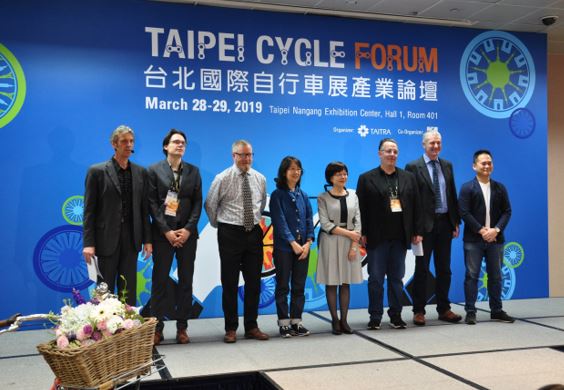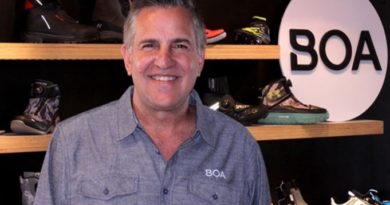Taipei Cycle Forum: Urban mobility & creating future cities
Urban mobility is rapidly emerging as a key market for growth, opportunity and innovation for the cycling industry. Taipei Cycle Show’s Cycle Forum explores how design, culture and tech trends could be utilised to improve cycling in the cities of the future…
An overriding theme of this year’s Taipei Cycle Show was urban mobility, a concept continuing to make waves in cycling and micro-mobility. In an urban setting, the bicycle can become a commuter’s everyday transport choice, a local business’ delivery vehicle, or even an eco-friendly taxi service. How the bike industry can capitalise on this burgeoning area formed the basis for discussion during the show’s two-day Cycle Forum, which brought together industry experts from across the globe. Speakers proficient in the areas of bike design, cycling culture and e-bike trends imparted their wisdom, observations and recommendations on how the industry can create the ultimate bike friendly cities of the future.
SESSION 1> BICYCLE DESIGN
Mark Sanders, Director, MAS Design
Stephen Esser, Constructing CAD, SQ Lab
Henry Chang, Chief Designer, Gearlab
The Cycle Forum kicked off its first session with a look at design excellence in the cycling industry. Describing the bicycle as the “perfect human amplifier,” Sanders introduced his ‘Blue Ocean’ concept, which suggests the bike industry’s image must be desirable to all, rather than just cyclists or ‘sporty males.’ According to him, cycling has a real opportunity in the urban mobility market if there is a shift in focus from sport to transport, with the same ringing true for the design of apparel and accessories. Sanders’ ‘Blue Ocean’ concept suggests that only 20% of the cycling industry’s potential market is currently being reached, with a whole host of untapped potential. “The bike industry must lead design, not follow,” he said. “We must design with everyone else, making real userfocused improvements and looking at everything that makes life easier.”
Esser seconded Sanders’ idea of a ‘Blue Ocean’, revealing statistics stating 10% of people already ride, anestimated 60% of people are interested in cycling however are scared or frustrated with current provision, and 30% of people will never ride. In his opinion, bikes need to be designed with the human body in mind, consulting doctors and health specialists to provide ergonomic improvements to fit the user, or they simply won’t be used. “We need to create the right compromise for customers when it comes to safety, comfort and looks,” Esser advised. “It is important to learn about new materials and production processes and to be able to predict what’s coming, such as cargo bikes.”
The relationship between design and solution was also raised by Chang, who believes that design exists to solve problems. In his opinion, the market continues to solve problems that have been solved before with new solutions. “Are you sure you’re doing the right thing to solve a problem?” He asked the room. “You have to ask yourself, what do you want to solve? When we have a list of what to solve, it’s mostly specs because they’re tangible. It’s the intangible that will set your company apart and where design is effective.”
SESSION 2> CYCLING CULTURE
Klaas Verschuure, Deputy Mayor, City of Utrecht, The Netherlands
Rich Conroy, Director of Education, Bike New York
Vicky Yang, CEO, Cycling Lifestyle Foundation
This session focused on trends in cycling culture from three different perspectives; the bike-friendly Netherlands, car-favouring US and Taiwan with its moped monopoly. With one million bikes sold in the Netherlands last year alone, and 35,000 km of cycle paths throughout the country, it’s clear that the Dutch are onto something.
According to Vershuure, bikes are seen not merely as a pastime, but as a vital means of transport. “Urbanisation is a worldwide trend,” he said. “Cities are becoming busier each day, so how do we make it more pleasant to work and live there? A policy which prioritises healthy living goes some way to creating a flourishing urban society.” In Vershuure’s opinion, cultural change is the biggest barrier to the bicycle’s urban mobility success: “The most important success is co-operation between businesses, residents, unions and knowledge institutions, which are all involved in decision-making processes and work together.”
Conroy believes a bike culture would see the bicycle become a default choice of transport. In a country with a proud motor vehicle heritage, existing alongside a BMX and mountain bike culture, integrating urban mobility solutions in to such a large and diverse land mass is tricky, to say the least. “The US has a long way to go in treating cycling as an everyday activity, we still have a car culture here and there’s a winner and loser mentality over road space. Every bike lane or path built turns in to a big political argument.” Conroy also believes bike advocates may be hindering the cycling culture cause: “When you spend too much time saying how dangerous the streets are to cycle on, it puts people off. You don’t sell a product by linking it to death.”
Yang and her YouBike bike-sharing system also have road competition from mopeds, the main transport mode of choice for getting around the island’s cities. However, Taipei’s Riverside Park Transformation project saw 1,450 new bikes donated in a bid to rejuvenate the space and make bikes available for everyone. The basis for this project, and those carried out in the inner cities, came as a result of Yang visiting cities such as Utrecht to observe leading infrastructure and practices to implement them in Taiwan. “It is impossible to create the cycle culture and lifestyle without policy support,” Yang admitted. “Now, after the delegation visited Utrecht, the government has a better idea of how to implement the bike-sharing schemes in the cities.”
SESSION 3> E-BIKE TRENDS
Susanne Brüsch, CEO, Pedelec Adventures
Marian Baukrowitz, Director of Research, 4C Consumer Insight
Manuel Marsilio, General Manager, CONEBI
Whether you consider them to be ‘cheating’ or not, it’s hard to argue against the rise of e-bikes as an industry-changing phenomenon. Pedal-assist features have helped to open up cycling to larger and more varied groups of people than ever before, while providing credible commuting alternatives for longer journeys. The e-bike has in turn led to the development of e-cargo bikes which can be utilised as last-mile delivery alternatives, green taxi services and for simply transporting your shopping.
This session asked the question; what are the trends the cycling industry should focus on in the next five to 10 years? The forum’s speakers and attendees collaborated to come up with recommendations to help the industry capitalise on the e-bike as a driver of urban mobility solutions, firstly through managing relationships with the automotive industry and creating a crossover to complete the user experience. Greater product differentiation is needed, according to the recommendations, to cater for entire families, however those partaking believed the e-bike needed to stay close to the normal bike, with availability of energy in view of consumption.
SESSION 4> FUTURE CITY
Morten Kabell, CEO, Copenhagenize Design Company
Kevin Mayne, Chief Executive, Cycling Industries Europe
Shyue-tair Chen, Commissioner, Department of transportation, Taipei City Government
The final session of the Taipei Cycle Forum collated the discussions had across the two days, in a bid to determine the cycling industry’s role within urban mobility, answering the all-important question: How do we sell it? According to Kabell, infrastructure and provision is vital to the success of a bike-friendly city, while it has to make economic sense for a person to cycle, infrastructure is the biggest pull. “Communication is key in attracting and appealing to people,” he said. “This is not just about cycling, but about creating better cities. You have to know your data and choose your arguments, providing different groups with alternatives.”
Mayne stated that EU Cycling is aiming to see 240 million cycling trips completed a day throughout Europe by 2030, with car-free centres and cities a key aim for European cities of the future. However, he warned of the chaos of new tech start-ups providing alternative micro-mobility solutions to the bicycle. Electric scooters, drones and even hoverboards are all fighting for space in the urban mobility market. “The bike industry has the chance to take ownership and create its own rules here. It needs to find proxies and ways into digital, to be a part of that world. If digital highways exist, cycling needs to be a part of that world. There needs to be a collective approach to creating bike-friendly future cities.”
A recurring sticking point which surfaced during the discussions was that of regulation. Regulatory frameworks for bike-share systems and micro-mobility do not currently exist, and that breathes uncertainty over what is coming next. “This is the new Wild West,” shrugged Mayne. “Everyone wants to get rich, commercial companies especially. Cities and governments are playing catch-up with technology.” So, how do we conquer the challenges of creating bike-friendly cities? According to Kabell, it needs to be a citizen-driven, bottom-up change towards an environmentally-friendly, sustainable, CO2-free approach. Meanwhile, Mayne believes the commercial benefits of car-free city zones speak for themselves, and these are worth it despite engineering works.
During the interactive part of the forum, attendees were asked the following question: Who should the cycle industry be talking to in terms of urban mobility, in order to have a decisive influence? After much discussion and digression, it was advised that the best ports of call are the following:
• Logistics companies
• App developers
• Emergency/health services
• Educators
• Local businesses
• Automotive industry
• GPS companies
• Hotels
• Media channels
• Property developers
• Self-regulated industries
The Taipei Cycle Forum attracted over 250 attendees and buyers. Next year’s Taipei Cycle Show will take place 4-7 March 2020.



